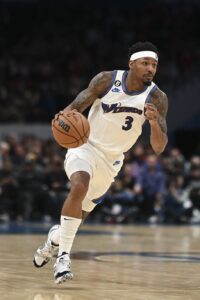It’s not uncommon in many major professional sports for a player to negotiate a contract that includes a no-trade clause, which prohibits him from being traded – either at all or to certain specific teams – without his consent. However, no-trade clauses are extremely rare in the NBA.
 When the Wizards signed Bradley Beal to a new contract in 2022 that included a no-trade clause, Beal became just the 10th player in NBA history to receive that perk.
When the Wizards signed Bradley Beal to a new contract in 2022 that included a no-trade clause, Beal became just the 10th player in NBA history to receive that perk.
In order to qualify for a no-trade clause, a player must meet the following criteria:
- He must be signing a free agent contract, not an extension.
- He must have at least eight seasons of NBA experience.
- He must have spent at least four seasons with the team he’s signing with.
This last point is the most malleable of the three. In order to qualify for a no-trade clause, a player doesn’t necessary need to have spent the past four consecutive seasons with his team — he just needs to have spent at least four seasons with that team at some point.
For example, if LeBron James were to become a free agent next summer and decided to sign with the Heat, he could negotiate a no-trade clause into his new contract, since he spent four years in Miami from 2010-14.
Additionally, a partial season can be counted as one of those four seasons a player needs to spend with a team in order to qualify for a no-trade clause. For instance, if Jordan Clarkson had become a free agent this offseason, he would’ve been eligible to negotiate a no-trade clause with the Jazz, who traded for him during the 2019/20 season. Clarkson has only been in Utah for three full years and part of a fourth season, but that’s enough to meet the criteria.
Still, those three requirements are enough to eliminate a no-trade clause as an option for many players. One prominent recent example is Jaylen Brown. Although Brown has spent more than four years with the Celtics, he has only been in the NBA for seven seasons and is signing an extension rather than a free agent contract, so a no-trade clause wasn’t available to him.
A player who has a no-trade clause in his contract and consents to a trade retains the right to veto a trade when he joins his new team. So Beal’s no-trade clause remains in effect now that he’s a member of the Suns.
Although explicit no-trade clauses are rare, there are a couple other scenarios in which a player can receive an implicit no-trade clause, meaning his consent is still required in order to trade him.
First, a player who re-signs with his previous team on a one-year contract, or a two-year deal with an option year, is given no-trade protection for the rest of that league year — or until his second-year option is exercised.
Heat forward Kevin Love and Suns wing Josh Okogie are among the players who will fall into this group in 2023/24.
Here are a few more notes related to these criteria:
- A player who meets these criteria and still decides to consent to a trade will lose his Bird or Early Bird rights at the end of the season and will instead be deemed to have Non-Bird rights.
- Although those criteria don’t apply to players on two-way contracts, they do apply to players who accept standard (ie. non two-way) one-year qualifying offers as restricted free agents. So Hornets forward Miles Bridges will have the right to veto a trade in ’23/24.
- The NBA’s new Collective Bargaining Agreement allows a player who re-signs with his former team on a one-year contract (or two-year deal with an option) to waive his ability to veto a trade. A handful of players have done so this offseason, including Lakers guard D’Angelo Russell and Nuggets guard Reggie Jackson. They’re eligible to be traded without their approval in 2023/24.
Second, a player who signs an offer sheet as a restricted free agent and has that offer matched by his previous team has the ability to veto a trade for a full calendar year. That means Trail Blazers swingman Matisse Thybulle and Sixers big man Paul Reed will have de facto no-trade protection until next July.
While explicit no-trade clauses in the NBA are rare, these criteria that give players veto rights for a year at a time aren’t uncommon at all, and often end up applying to non-stars, giving them a little control over their own professional futures.
Note: This is a Hoops Rumors Glossary entry. Our glossary posts will explain specific rules relating to trades, free agency, or other aspects of the NBA’s Collective Bargaining Agreement. Larry Coon’s Salary Cap FAQ was used in the creation of this post.
Washingtons decision to give Beal a NTC will go down in history as one of the most boneheaded moves an NBA FO has made in the 21st century. With the rarity of it’s inclusion in any prior contracts and the massive amount of money he was guaranteed, it’s hard to picture his camp demanding a NTC be included.
Maybe his camp did and he’s been playing 3D chess. Seems much more likely that the Wiz just offered it to him to maximize their offer and get him to stay. To do that and then immediately decide to commit to a rebuild they’ve been putting off for a decade is just horrible decision making from the entire FO.
Hope they make something out of JP.